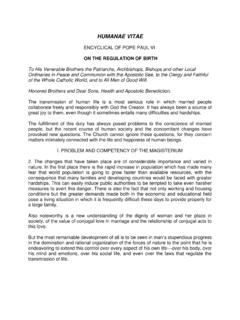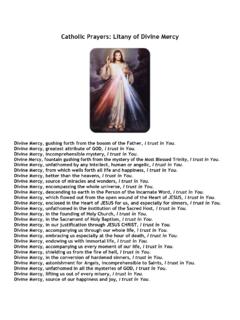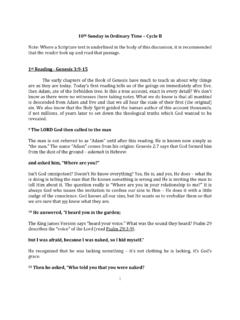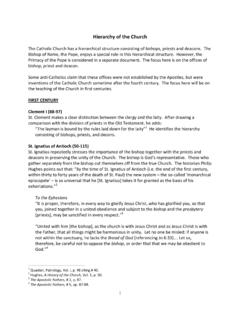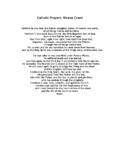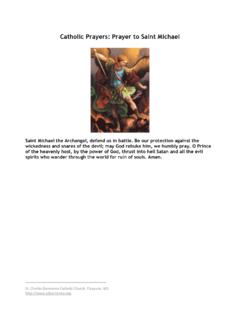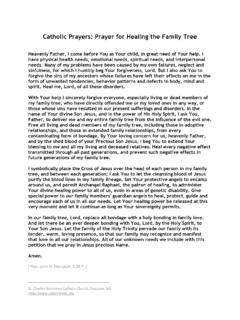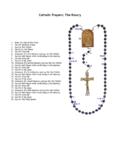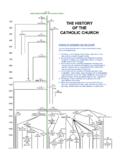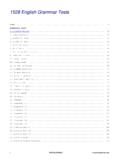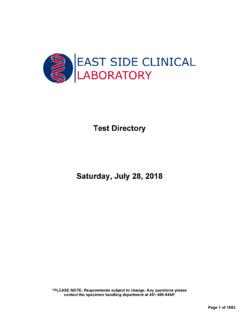Transcription of CATECHISM TEST #1 of 7 - Charles Borromeo
1 CATECHISM TEST #1. (CCC #26-#421). In answering the questions below place a ? in front of the question if you are not certain of the answer. Place a G in front of the question if your answer is a guess. Note: some questions may have multiple answers. To have your test graded, forward your answers to Jim Seghers' Totus Tuus Ministries at 1. The desire for God (27): a. is written in the human heart. b. Must be carefully developed because it is not innate to man. c. is innately lacking in many individuals. 2. Men may reject God through sin (29): a. but he cannot never forget his longing for God b. and lose the sense of his vital bond to God c. neither 3. We can know God (31): a. only through the gift of faith b.
2 Through proofs of reason like the proofs in natural sciences c. by reason alone through converging and convincing arguments 4. It is possible to arrive at knowledge of the existence of God through the physical order, starting from movement, becoming, contingency, order and beauty (31- 32). a. entirely true b. entirely true for every rational person c. entirely false 5. The reality of mankind's freedom and the voice of conscience can lead to discovering the existence of God (33): a. partially true b. entirely false c. entirely true 6. Which of the following statements is/are true (34): a. Man contains within himself his first principle. b. Man does not contain within himself either his first principle or last end.
3 C. Man contains within himself is first principle, but not his last end. 1. 7. To achieve real intimacy with God depends on (35): a. God revealing himself and giving grace b. God revealing himself c. God giving his grace 8. Revelation allows men to know God (38): a. with no admixture of error b. with certainty c. with ease, certainty and with no admixture of error 9. Which of the following statements is/are correct (43): a. Faith allows us to grasp God as he is. b. Similarities between God and his creatures actually expresses a greater dissimilitude. c. Both are correct. 10. Which of the following is/are true (51): a. The Father calls all men to himself directly. b. It pleases God to have men share in the divine nature.
4 C. Both. 11. The fullness of God's revelation is found in (53, 65, 75, 100): a. Sacred Scripture b. Sacred Scripture and Sacred Tradition c. Jesus Christ 12. The first parents were created (54): a. in a state of grace and justice b. with natural goodness and preternatural gifts only. c. outside of God's covenant 13. The division of nations (57): a. was a punishment of sin b. was not a result of sin c. limited the pride of men 14. Which of the following statements is/are true (60): a. Abraham's descendants became the chosen people. b. The covenant with Abraham did not benefit the gentiles. c. Abraham is not a saint in the same sense of the New Testament saints. 2. 15. The New Covenant (66): a.
5 Was not foreseen in the Old Covenant b. will never pass away c. will last until the end of time 16. Private revelations (67): a. adds to the deposit of faith b. are to be believed with the virtue of faith only when approved by the Church c. help us live the Christian life more fully 17. God desires all men to be saved (74): a. entirely true b. entirely false c. usually true 18. Which of the following statements is the most complete (75): a. The Gospel teaches us about Jesus. b. The Gospel is the source of all saving truth and moral discipline. c. The Gospel is the most perfect, but not the only source of saving truth. 19. Tradition (78): a. is a distinct source of revelation and therefore is not connected to Sacred Scripture b.
6 Comes from the Holy Spirit not the Church c. is a source of divine revelation 20. The teachings of the Fathers (78): a. are infallible b. witness to Tradition c. is not a part of Tradition 21. Which of the following is the most complete answer (80): a. Scripture and Tradition form one deposit of revelation. b. They have the same goal and come from the same source. c. Both 22. Tradition was entrusted to the Apostles by (81): a. Jesus and the Holy Spirit b. the Holy Spirit c. Jesus 3. 23. The certainty of our faith is derived from (82): a. only Sacred Scripture b. only Tradition c. Sacred Scripture and Tradition 24. The Sacred deposit, depositum Fidei (84): a. is primarily rooted in official decrees of the Magisterium b.
7 Is contained in Scripture and Tradition c. is contained in the four Gospels 25. Which of the following is true? The authentic interpretation of the Word of God has been entrusted to (85): a. the bishops b. the Pope alone c. the Magisterium 26. The teaching office of the Church can be said to be superior to the Word of God (85): a. true b. false c. partially true 27. The faithful are obliged to receive the Churches teaching with docility (87): a. only when the Church speaks infallibly b. to all the teachings and directives of the Church c. to all infallible teachings, but not to non-infallible teachings 28. Authentic interpretation of the Word of God has been entrusted to (100): a. the Magisterium alone b.
8 The Magisterium, scripture scholars, and theologians c. the Magisterium, scripture scholars, theologians, and the faithful 29. In Sacred Scripture God speaks (102): a. many words in Hebrew and Greek b. a single Word c. in all versions of the Bible 30. Which statement is correct (106, 120): a. The Church alone determined which books were divinely inspired. b. The Bible informs us which books are divinely inspired. c. The evidence of history proves which books are divinely inspired. 4. 31. Which of the following statements if false (105, 105). a. God is the author of the Bible. b. God inspired human authors to write the Bible. c. Non-essential doctrinal errors are not incompatible with the truth contained in the Bible.
9 32. The Catholic holds the Bible in such high regard that it can be said it is a religion of the book (108): a. absolutely true b. absolutely false c. sometimes true 33. It is not important to discover the intentions of the human authors of the Bible because the intent of the divine author is the only vital consideration. a. false b. true c. sometimes true and sometimes false 34. To properly interpret the Bible all the following are vital except (112,113, 114): a. be attentive to the content and unity of the whole b. the analogy of faith c. the interpretations of scholars 35. The literal sense is the basis for all sound biblical exegesis (116,117): a. usually b. only, when viewed in connection with the spiritual senses c.
10 Always 36. The spiritual senses of scripture are intended to deepen our faith (allegorical), charity (moral), and hope (anagogical) (117): a. always b. not directly c. there is no real applicability 37. Since the fullness of revelation is in Jesus Christ, the Old Testament is not an indispensable part of Sacred Scripture is the New Testament. a. entirely false b. entirely true c. partially true 5. 38. All the following statements are true except (126): a. Paul's epistles are the heart of the Scriptures. b. The Gospels affirm the historicity of Jesus' life and teachings. c. The Gospels reflect oral tradition. 39. The unity of the Old and New Testaments is illuminated through (128): a. inspiration b.
